Joint statement: Trans children and young people in schools deserve safety and understanding
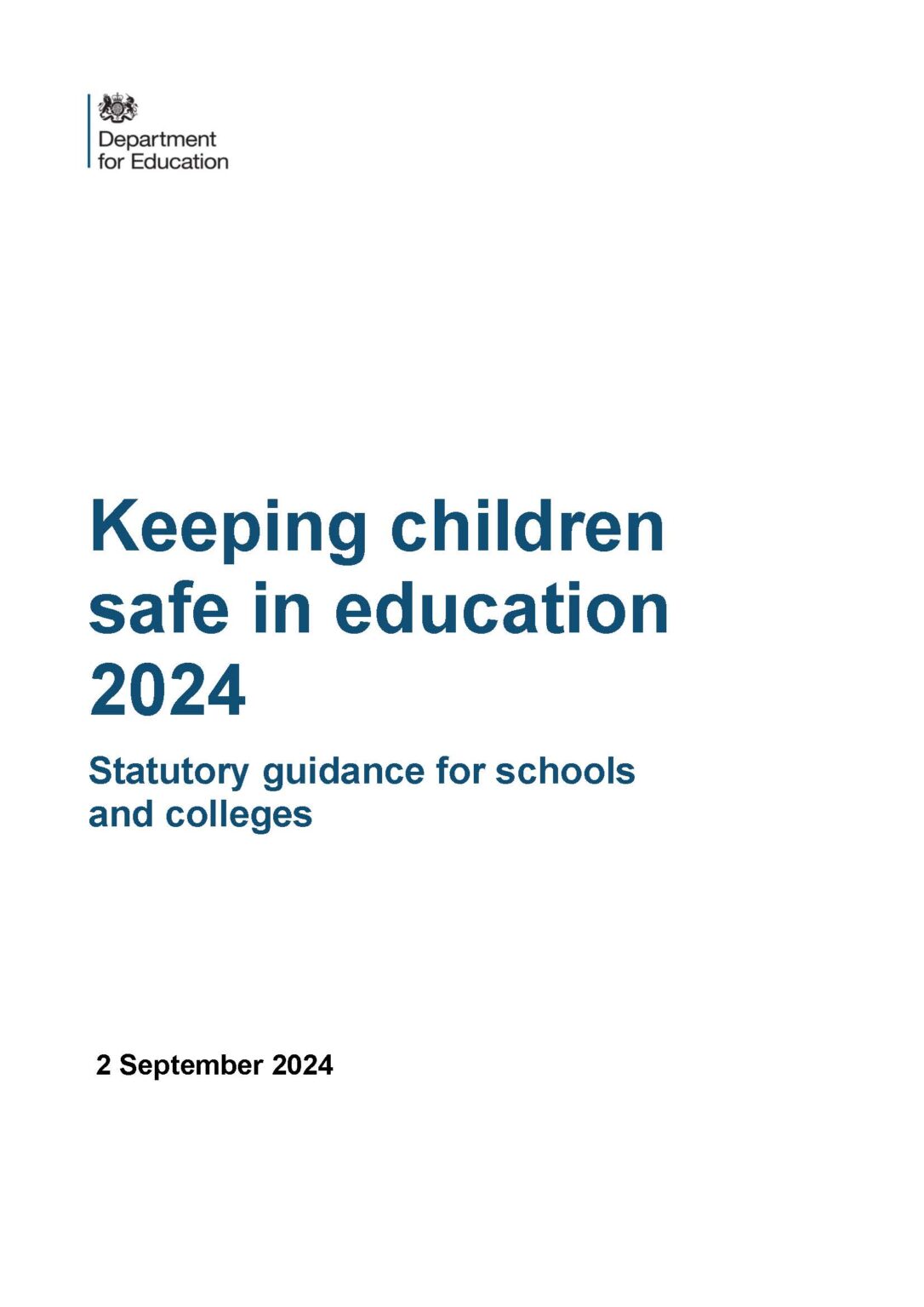
This statement was drafted by IGLYO with input from UK inclusive education experts and Members, and was endorsed by ILGA-Europe and Transgender Europe (TGEU).
We condemn the UK Statutory Guidance for Schools & Colleges and their failure to include trans and non-binary students in an affirming, supportive way.
Returning to school in September should be an exciting time for young people, catching up with friends, and new adventures ahead. Yet, trans children and young people in England continue to be targeted by exclusionary policies in education. On 2 September, the UK government published its updated legally-binding guidance for schools and colleges in England, with a section on LGBT persons that remains under review, titled “Keeping Children Safe in Education 2024”.
While we recognise the importance of providing clear guidance to schools and colleges in relation to safeguarding young people, we are concerned about the harmful and untrue narratives underlying this guidance in relation to young people’s identity. If kept in its current state, this guidance could provide a pathway to strip young trans people of their rights and agency, while perpetuating harmful stereotypes.
We are particularly concerned by the following:
- The updated guidance refers to children and young people being LGB in affirming ways but has removed parallel references for trans children and young people. We strongly condemn the government’s decision to remove trans identities from this list and its previous guidance and stress the need to reintroduce language that protects young trans people. To keep trans children safe in education, we call upon the UK government to recognise the harms of transphobia and bullying ever present in UK schools and colleges and to provide a clear framework in relation to safeguarding trans children’s well-being and identity.
- We also note with concern that the UK government continuously refuses to recognise trans identities in young people as real, conflating such terminology with ‘gender questioning’ throughout its guidance. This rejects the idea that young people can be trans. We recall that this linguistic shift was observed in other recent government guidance, including the draft schools and colleges guidance “Gender questioning children” and the “Draft Relationships Education, Relationships and Sex Education (RSE) and Health Education” statutory guidance.
- The UK government cross-references guidance that is in draft form and in consultation to reinforce its harmful messaging. There has been no response by the government to the consultation, including to concerns expressed through inputs by educators, policy experts, human rights groups, and young people themselves during the consultation.
- The “Keeping Children Safe in Education 2024” guidance uses the Cass Review as an evidentiary basis for this policy change, despite its poor and inconsistent use of evidence, pathologising approaches, and exclusion of service users and trans healthcare experts. As stated by healthcare activist and feminist researcher Dr Ruth Pearce in an article titled “What’s wrong with the Cass Review? A round-up of commentary and evidence” (2024), the Cass Review “has been extensively criticised by trans community organisations, medical practitioners, plus scholars working in fields including transgender medicine, epidemiology, neuroscience, psychology, women’s studies, feminist theory, and gender studies”.
- The “Keeping Children Safe in Education 2024” guidance recommends that families are involved in social transition in schools, despite the potential safeguarding risks of outing students to their caregivers. Research by Galop (2022), UK’s LGBT+ anti-abuse charity, noted that 2 in 5 trans or non-binary people had experienced abuse at the hands of family members, with the majority experiencing this before they turned 18 and often in relation to their gender identity. We reiterate that all young people, including trans young people, have the right to privacy, which must be respected. Trans children and young people should be supported in choosing for themselves when and how to share information about themselves with their parents or guardians. We are also concerned that the government refers to ‘exceptionally rare’ situations in which there could be a safeguarding reason to not inform parents but provides no evidence for this being exceptionally rare and no guidance for how schools decide when this risk threshold is met.
- We also stress that the guidance as it stands now recommends that schools encourage parents to seek “clinical help and guidance”, which is not only dehumanising and pathologising, it is also virtually impossible due to the UK government’s restrictions on gender-affirming care to young trans people. Parents and guardians should listen to trans children and young people and respect their identity and wishes. Not rush them off to a doctor’s office.
- We further condemn the guidance’s conflation of being trans with mental illness and autism. While some trans young people may experience mental health difficulties both as a result of transphobia and unrelated reasons, neither mental illness nor autism is intrinsic to their gender identity. We urge the government to stop scapegoating trans young people and creating further divides across communities. This is extremely dangerous and harmful to not only trans youth, but also neurodivergent and autistic youth, including those that are both trans and autistic.
On the guidance, Alex Feis-Bryce (He/him), Executive Director of our UK Member Diversity Role Models noted: “I am very concerned about the lack of clarity this update provides teachers and school leaders on their return to school and the impact it could have on trans young people. The proposed changes, that remain under review, could strip young trans people of their agency. To keep children safe in education and ensure that their right to privacy is protected, any education policy should recognise the challenges young trans people currently face in education, including bullying on the basis of their real or perceived difference, not introduce additional barriers.”
The “Keeping Children Safe in Education 2024” guidance is just another step in the deeply worrying march toward the attack against trans people in the UK. We urge our members across the Council of Europe region to take note and prepare for similar attacks in their home nations.
IGLYO, the world’s largest network for LGBTQI young people and students, and signatories of this statement ILGA-Europe and Transgender Europe (TGEU) call on the UK government and policymakers to stop fueling this moral panic against trans young people and discard dangerous changes proposed to the aforementioned pieces of guidance. Trans children are at increasing risk of isolation, alienation and violence. It’s time to get on the right side of history and protect trans children, and their human rights.
Joint statement on Italian Constitutional Court ruling on non-binary & trans persons’ rights

ILGA-Europe and TGEU welcome a judgement of the Italian Constitutional Court finding that non-binary peoples’ rights are protected under the Italian Constitution
In a judgment published last week, the Italian Constitutional Court found that non-binary peoples’’ rights are protected under the principles of social identity, equality of citizens and the right to health as guaranteed by the Italian Constitution. The Court did not, however, recognise a right to be registered as non-binary in Italian civil registries. The Court also repealed the legislative provision requiring trans people to obtain a court’s authorisation prior to accessing transition-related surgery.
ILGA-Europe and Transgender Europe (TGEU) welcome this decision but regret that the Court failed to recognise a right to a third legal gender option in Italian registries and identity documents. Our organisations submitted an amicus curiae in the case, expressing that the introduction of a third legal gender option protects the rights to self-determination, dignity and private life of many trans people, intersex people and people of other gender identities.
The decision follows a referral by a regional court on the case of a non-binary Italian citizen, raising two questions of constitutionality to the Constitutional Court.
Missed opportunity to recognise a third legal gender option in the Italian system
The first question concerned the current lack of a third legal gender option in Italian registries and identity documents.
The applicant argued that the failure to recognise non-binary gender identity harms individuals’ social identity (Article 2 of the Constitution) and equality before the law (Article 3 of the Constitution), since legal gender recognition is allowed only to those whose gender identity falls within the binary. The Court also examined a violation of the fundamental right to health under Article 32 of the Constitution, and whether the lack of recognition of non-binary gender identity compromises psychophysical wellbeing.
The Constitutional Court declared this question inadmissible, citing the wide repercussions that the introduction of a third legal gender option would have on various sectors of the legal system, which would necessitate a systemic legislative reform of the system and of the many institutions currently operating under the gender-binary logic.
However, the Court brought this question to the attention of the legislator. It noted that the lack of a third legal gender option in the Italian system can lead to unequal treatment and/or can compromise the psychophysical wellbeing of concerned individuals, which can in turn raise issues around the respect for social dignity and protection of health under Articles 3 and 32 of the Constitution.
The applicant, as well as ILGA-Europe and TGEU – Trans Europe and Central Asia in their third-party intervention, recalled that non-binary gender identity has now been recognised in numerous legal systems across Europe. Iceland and Germany are leading the way and Denmark and Malta partially acknowledge non-binary identities) [1]. A gender marker option in official registries and documents other than male or female (unspecified or third gender marker option) is an important issue for a growing number of people in trans and intersex communities. The EU Fundamental Rights Agency (FRA) found that nearly every second person in the trans community identifies outside of the gender binary, that is not (entirely) identifying as male or female [2].
The Italian Constitutional Court ruling was highly anticipated in this respect, and it could have triggered legislative changes inspiring other countries to follow suit and potentially transforming the landscape of non-binary rights in Europe.
Unconstitutionality of the obligation for trans and non-binary people to obtain judicial authorisation to access transition-related surgeries
The second question concerned the obligation in Legislative Decree no. 150 of 2011 for trans and non-binary people to obtain a court decision to be authorised to access transition-related surgical interventions.
The applicant argued that such an obligation violates the fundamental right to self-determination (Article 2 of the Constitution) and the right to equality before the law (Article 3), since requiring judicial authorisation for a medical procedure that is lawful is unreasonable. Such a requirement is also discriminatory, because other similar interventions not linked to gender identity, are left exclusively to medical judgment and to the patient’s consent.
The Court ruled that such a requirement was unconstitutional. It reiterated that for the purpose of legal gender recognition, it is necessary and sufficient to ascertain the “objective transition of gender identity” which can be accomplished through hormonal treatments and psychological-behavioural support, without a surgical intervention. As such, according to the Court, the blanket requirement for judicial authorisation before surgical interventions is manifestly unreasonable and unnecessary.
Notably, the Constitutional Court referenced the changing jurisprudential framework in Italy on this issue, highlighting the growing Italian case-law authorising surgery at the same time as ordering legal gender recognition.
Further to this ruling, trans and non-binary people in Italy will be able to obtain surgeries as part of their trans-specific healthcare without a judicial decision, a requirement that often led to arbitrary and lengthy procedures.
ILGA-Europe
TGEU (Trans Europe and Central Asia)
- As pointed out by the applicant, the EU itself provides standard forms containing three gender options Non-Binary gender identity is recognised under Regulation (EU) 2016/1191 of the European Parliament and the Council of 6 July 2016 on the free movement of citizens on promoting the free movement of citizens by simplifying the requirements for presenting certain public documents in the European Union and amending Regulation (EU) No 1024/2012
- Russell, Sanders, Watkins, Diving into the FRA LGBTI II Survey Data: Trans and non-binary briefing’, p. 3, available at: https://tgeu.org/intersecting-oppressions-trans-people-in-europe/
What European countries might soon start recognising non-binary people?

Interested in the current state of non-binary rights in Europe? This concise guide covers the most important updates and developments you should be aware of
Current situation
As of 2024, only a few European countries officially recognise non-binary gender markers. Iceland and Germany lead the way, allowing non-binary people to have their identities legally acknowledged. Denmark and Malta partially acknowledge non-binary identities, though issues remain, particularly in areas like the healthcare sector. You can read more about it in one of our previous blogs. However, progress is slow, and many countries still lack comprehensive legal frameworks for non-binary recognition.
Which countries are next?
France and the SNCF case: potential impact across the EU
Last Thursday (July 11, 2024) the Advocate General of the Court of Justice of the European Union (CJEU) gave his opinion that France’s national railway company SNCF should stop forcing passengers to choose between the civil titles “Mr” or “Ms” when purchasing train tickets. This landmark case, brought by Association Mousse, could set a precedent similar to the Deutsche Bahn case in Germany across the European Union.
In his opinion, which was published earlier this week, the Advocate General of the CJEU said that it is not “necessary” and that it is therefore unlawful for the SNCF to collect individuals’ civil titles. The Advocate General also agreed with Association Mousse that processing data on civil titles creates a risk of discrimination on the grounds of gender identity for trans and non-binary people notably as other States legally recognise non-binary identities.
Should the CJEU’s judgement align with the opinion of the Advocate General, all organisations collecting gender markers would be forced to stop doing so when it is not necessary for the service provided. The outcome has the potential to influence broader European standards for non-binary recognition, emphasising the role of strategic litigation in advancing rights.
Belgium’s legal hurdles
Belgium’s journey towards non-binary recognition has faced significant setbacks. In 2019, the Belgian Constitutional Court declared the existing laws discriminatory towards non-binary people. The government proposed removing gender markers from ID cards entirely, but this reform has stalled due to political and technical challenges. Despite these obstacles, there are plans to eventually implement these changes.
Italy on the verge of change
Italy is also nearing a significant decision. The Italian Constitutional Court is expected to rule on the inclusion of a third gender marker. This ruling could trigger legislative changes, inspiring other countries to follow suit and potentially transforming the landscape of non-binary rights in Europe.
Legal battles play a pivotal role in the fight for non-binary recognition. Cases like the ones in France and Germany highlight how litigation can drive change even when legislative processes are slow. These legal battles and proposed reforms are part of a broader movement toward inclusivity and respect for non-binary identities across Europe.
Beyond laws: the experience of being a non-binary person in EU
The third EU LGBTIQ survey report, published in June by the European Union Fundamental Rights Agency (FRA) offers some insights into non-binary lives. Almost 20% of respondents identified as non-binary, yet more than 90% do not have their identity legally recognised. When delving into the reasons behind this, it becomes evident that non-binary people face unique challenges and perspectives.
The reluctance or perceived lack of necessity for legal gender recognition (LGR) among non-binary people is often due to the accessibility and relevance of existing LGR frameworks. These frameworks typically do not include non-binary options, which discourages non-binary people from pursuing LGR.
For instance, while nearly 60% of trans women and men intend to seek legal gender recognition in the future, only 17% of non-binary respondents share this intention. This disparity suggests that non-binary people might not see current LGR options as applicable or beneficial to their identities, especially considering the potential discrimination they might face in the process.
Additionally, safety concerns significantly impact the daily lives of non-binary people. The FRA data revealed that 23% of non-binary people frequently hide their gender identity for safety reasons, a higher percentage compared to 10% of trans men and slightly more than trans women at 20%. This heightened sense of vulnerability underscores the pressing need for legal recognition and protection.
What do non-binary people want from the law?
Despite developments in Europe and farther afield, we still have relatively little data on what non-binary people want from the law and how they are currently experiencing different legal systems. This is something which ILGA-Europe, along with other civil society partners and a team of academics, will be looking to explore over the coming year. By understanding and addressing the specific challenges faced by non-binary people, we can better advocate for their rights and recognition across Europe.
Here is a list of useful resources for policy-makers and activists on the topic of non-binary rights:
- Rainbow Map: Legal gender recognition
- Human Rights and Gender Identity and Expression: Issue Paper by the Council of Europe Commissioner for Human Rights
- Non-binary gender registration models in Europe: Report on third gender marker or no gender marker options by Lena Holzer for ILGA-Europe
- Intersections – Diving into the FRA LGBT II Survey data: Trans and non-binary briefing by ILGA-Europe and TGEU
Joint Statement welcoming CJEU Advocate General on collection of gender binary civil titles

ILGA-Europe, TGEU and Association Mousse welcome the opinion of the Advocate General of the Court of Justice of the European Union confirming that the French national railway company, SNCF should stop collecting its passengers’ civil titles.
The opinion concerns a case initiated by the Mousse Association, representing 64 individuals, against France’s national state-owned railway company (SNCF) practice of forcing passengers to choose between the civil titles ‘Mr’ or ‘Ms’ when purchasing train tickets. The train company does not offer a third option.
The case relies on the General Data Protection Regulation (GDPR)’s principles of data minimisation and accuracy, as well as the fundamental EU law principle of non-discrimination.
Yesterday, CJEU Advocate General Maciej Szpunar said that it is not “necessary” under GDPR and that it is therefore unlawful for the SNCF to collect individuals’ civil titles. The Advocate General dismissed the SNCF’s arguments that the data collection in question is necessary to adapt its commercial communication or transport services depending on the passengers’ civil titles.
The Advocate General also agreed with Association Mousse that processing data on civil titles creates a risk of discrimination on the grounds of gender identity for trans and non-binary people notably as other States legally recognise non-binary identities.
As such, the Advocate General’s reasoning represents a positive step forward for the rights of non-binary people, but also more broadly, for LGBTI people who do not identify within the gender binary.
As the CJEU will now deliberate on this case, our organisations hope that the judgment will align with the opinion of the Advocate General and put an end to the misgendering and discrimination faced by non-binary people who are constantly forced to choose in their everyday lives between two options that do not correspond to their identity. Also, binary trans people, whose identity documents do not match their gender identity, will benefit from fewer mandatory forms asking for a gender marker, when it is not necessary to the service or contract at hand.
Therefore, a positive judgment would set a significant precedent for the inclusion of all gender identities in many areas of life, by requiring forms without any reference to gender markers or with inclusive options. It doesn’t take anything away from anyone, but it helps marginalised communities a lot.
Almost two-thirds (64 per cent) of trans respondents felt discriminated against in the year before the survey, followed by more than half (51 per cent) of non-binary and gender-diverse respondents, where every second respondent experienced discrimination in the same period, found the EU Fundamental Rights Agency LGBTI survey 2023. The same survey also found that 15 per cent of non-binary and 35 per cent of trans people said they experienced discrimination when they had to show their ID. In contrast, only 1% of cisgender endosex respondents reported such issues. Non-binary people make up the largest compound (65 per cent) of the trans community
ILGA-Europe and TGEU are providing support to Association Mousse and its lawyers, Etienne Deshoulières from Deshoulières Avocats and Johan Heymans, Yasmina El Kaddouri and Delphine Holemans from VS Advocaten, in this case.
ILGA-Europe
TGEU (Trans Europe and Central Asia)
Read the Advocate General’s opinion here.
European court to hear landmark case regarding discrimination against non-binary people
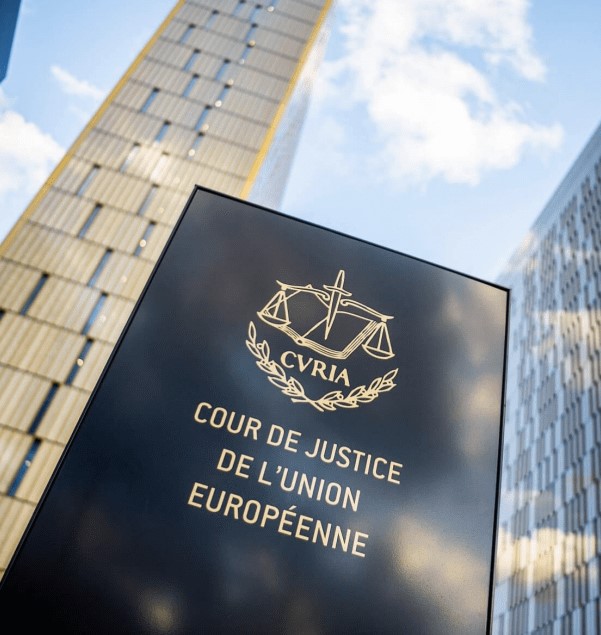
The Court of Justice of the European Union is to decide on lawsuit over the lack of provision of an option for non-binary persons, which may have a far-reaching effect
On Monday, April 29, the Court of Justice will be required to answer the question: Does GDPR and European non-discrimination law require organisations to provide an option for non-binary persons in their forms?
The hearing follows a lawsuit filed by the Mousse Association, representing 64 individuals, against France’s national state-owned railway company’s (SNCF) practice of forcing passengers to choose between the civil titles “Mr” or “Ms” when purchasing train tickets. If the association wins the case, private and public organisations in the 27 European Union States will have to either stop collecting gender markers when it is unnecessary or provide an option for non-binary persons in their forms.
This would be a significant step forward for the rights of non-binary persons, but also LGBTI people who do not identify within the gender binary.
The case relies on the General Data Protection Regulation (GDPR), invoking the principles of data minimisation and accuracy and European non-discrimination law. It aims to set a significant precedent for the inclusion of all gender identities in the European Union, by requiring forms without any reference to gender markers or with inclusive options.
According Senior Strategic Litigation Officer with ILGA-Europe, Marie-Hélène Ludwig: “The upcoming hearing is a crucial step to put an end to the misgendering and discrimination faced by non-binary persons who are forced to choose in their day-to-day lives between two options that do not correspond to their identity.”
According to Mr Étienne Deshoulières, the lawyer representing the Mousse Association: “This procedure is not only a fight against outdated forms, but a battle for the recognition and respect of each individual in their singularity. It defends the right of every person not to be trapped in the gender binary that does not correspond to their true identity. It is a question of respect for fundamental rights to self-determination, non-discrimination and the protection of personal data.”
ILGA-Europe, alongside Transgender Europe (TGEU), are providing support to the applicants and their lawyers in this case.
A new roadmap for advancing the human rights of trans and non-binary people
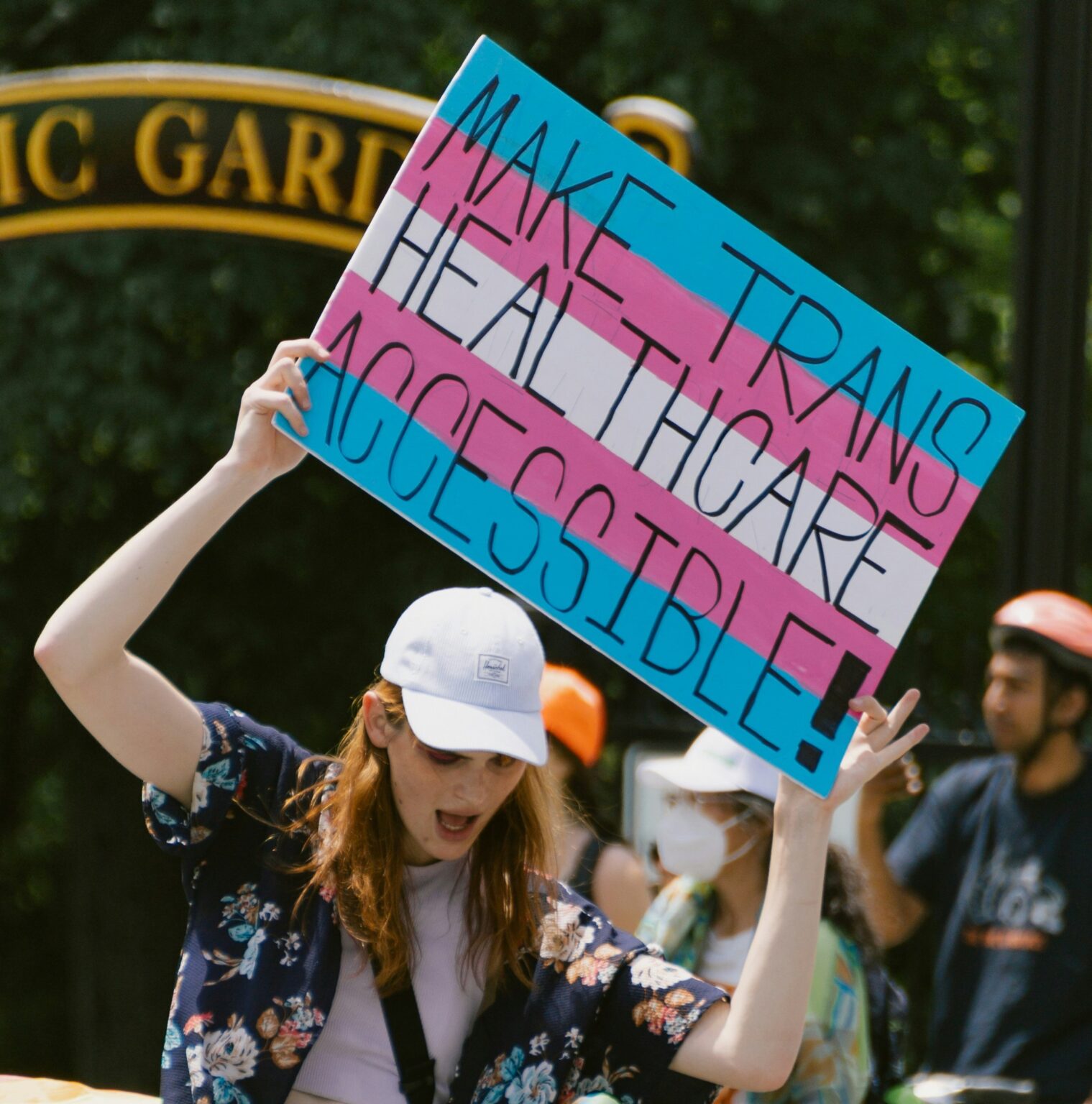
A brand new Issue Paper from the Council of Europe on Human Rights and Gender Identity and Expression not only sheds light on the challenges faced by trans and non-binary individuals across Europe and beyond, but also serves as a comprehensive tool for advocacy activism
The Council of Europe (COE) Commissioner for Human Rights, Dunja Mijatović, has released a new Issue Paper which thoroughly examines the challenges faced by trans and non-binary people across Europe. The Paper includes a wide range of insights, recommendations and analysis, offering a comprehensive overview of the landscape of the rights of trans and non-binary people in Europe and beyond.
The Paper includes 15 recommendations aimed at policymakers, legal professionals, civil society organisations, and other stakeholders, providing a clear roadmap for advancing the human rights of trans and non-binary people. These recommendations cover a wide range of demands activists have had for decades and cover a spectrum of directions, from fundamental reforms in legal recognition procedures, such as the removal of diagnosis and sterilisation requirements, to policy changes aimed at fostering greater inclusivity and respect for gender diversity, such as the call for the inclusion of non-binary gender markers on identity documents.
A dynamic new tool for change
This paper signals a renewed commitment of the COE to protecting the rights of trans and non-binary individuals, however, it is much more than that. It’s also a dynamic tool that provides a roadmap for advocacy efforts for legislative change. The 13 sub-chapters within the paper offer comprehensive analyses and recommendations, serving as robust advocacy tools in themselves, under these helpful headings:
• Enjoyment of human rights
• Equality and non-discrimination
• Gender identity and gender expression conversion practices
• Legal gender recognition
• Violence, hate crimes and hate speech
• Detention
• Family life
• Education
• Sport
• Employment
• Poverty and housing
• Healthcare
• Sanitation
• Asylum
Each sub-chapter is equipped with a wealth of references to human rights instruments, various studies, and laws, providing a solid foundation for advocacy work.
Let’s take recommendation No ’8 as an example:
Ensure that national laws prohibit discrimination due to gender identity and gender expression in all decisions relating to family life, including birth registration rules, custody, adoption and access to assisted reproductive technologies. When birth registration systems are gendered, trans people should be registered as parents in accordance with their gender identity, and alternative systems should continue to be explored to reflect the growing diversity of families.
Activists who have work on family rights for trans and non-binary people among their advocacy goals can go to chapter 2.6 in the paper, entitled Family Life. There are three subsections in the chapter: Parenthood, Parental status, and Trans families across borders. Each has references to case law or legal drafts and represents the Commissioner’s selection of arguments and resources that are most beneficiary to the cause.
In total, the paper includes 269 references, linked throughout. This not only demonstrates the depth of research underpinning the Issue Paper but also serves as a testament to its credibility and relevance in advocacy activism.
Powerful trans-inclusive terminology
The Paper also introduces a strong range of trans-inclusive terminology, ranging from “gender fluidity” to “non-binary identities,” thereby contributing to the normalisation and visibility of marginalised experiences. By embedding such terminology within a human rights framework, the paper not only validates the lived experiences of gender minorities but also challenges societal norms and stereotypes.
Consider the term “self-determination”, a concept prominently featured in discussions surrounding Legal Gender Recognition. This term, while commonplace in LGBTI activism discourse, holds profound implications for trans and non-binary individuals seeking autonomy over their gender identity. By unpacking such terminology within the Issue Paper, activists are equipped with the language and concepts necessary to articulate their demands and navigate legal and policy frameworks.
The importance of recognition
While LGBTI activists are intimately familiar with the gaps in trans and non-binary rights, it is of great importance that they are recognised and shed light upon in a forward-thinking paper from a human rights institution of such great influence, giving them further visibility across other movements and audiences. Through its comprehensive research, inclusive terminology, and actionable recommendations the Issue Paper on Human Rights and Gender Identity and Expression has every chance of contributing to our collective action in the advancing human rights of trans and non-binary people.
You can read the Issue Paper on Human Rights and Gender Identity and Expression here
Intersections: The LGBTI II Survey – Trans and Non-binary Analysis
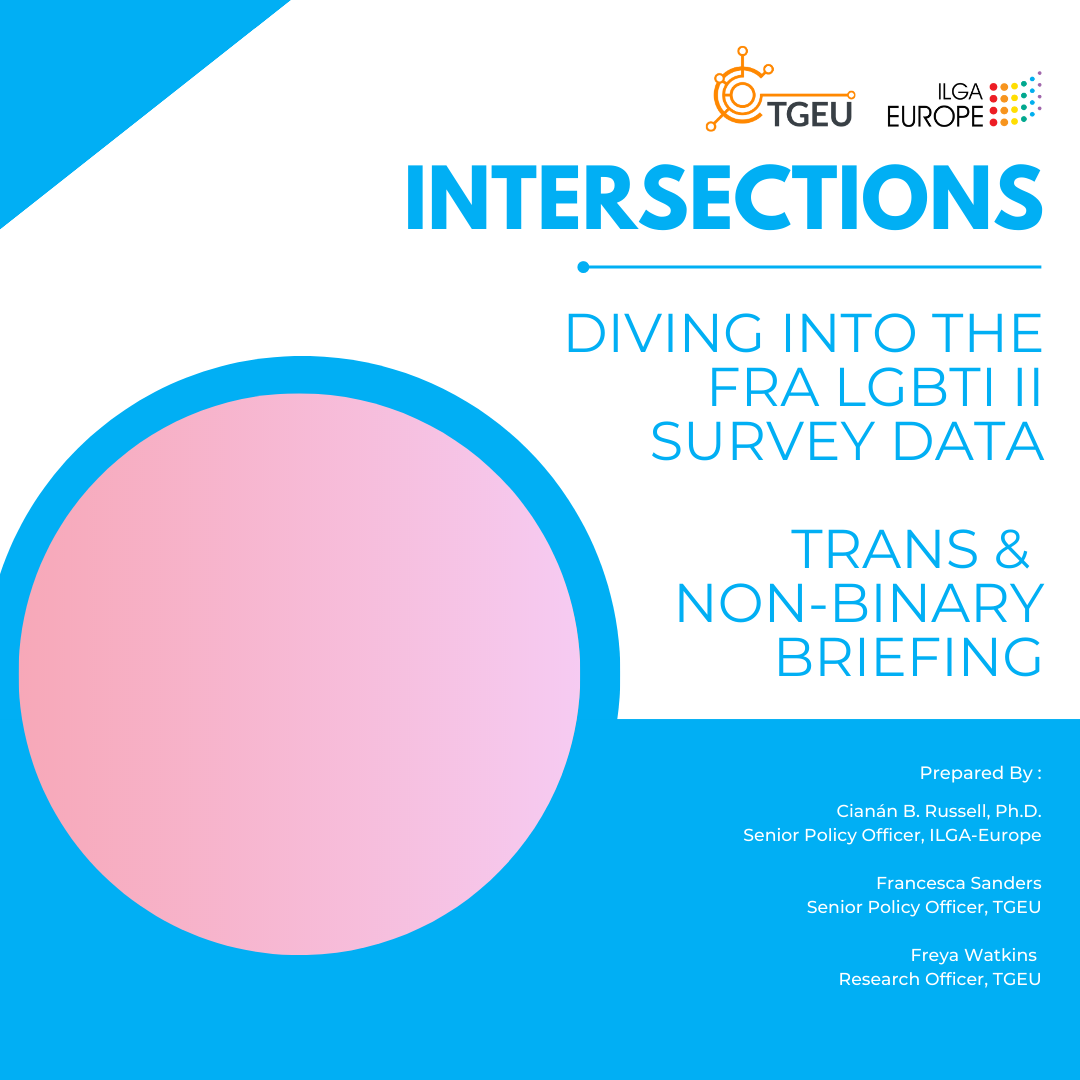
Disaggregated data, which can look deeply into the lived experiences of marginalised people, is a key demand of LGBTI and other human rights groups. With this in mind, over the last year ILGA-Europe have been partnering with a variety of NGOs in the region to analyse the FRA 2019 LGBTI Survey II data and pull out experiences of those experiencing intersectional marginalisation. This work is based on analysis co-commissioned by ILGA-Europe and TGEU.
This briefing on trans and non-binary people summarises the findings of data analysis disaggregating the responses of trans and non-binary people from the responses provided by all LGBTI respondents to the 2019 FRA LGBTI Survey II, in order to show the differences in their lived experiences. To understand the diverse challenges faced by trans and non-binary people, we created subpopulations of trans men, trans women, and non-binary people, and compared them with all respondents to the survey.
Despite limitations, this data set remains the largest available of trans and
non-binary people in Europe and provides a valuable insight into the experiences of a large number of trans and non-binary people across the EU. That it has been and will be repeated enables useful comparisons over time.
Right now, just three European countries recognise non-binary identities, but others are pushing forward
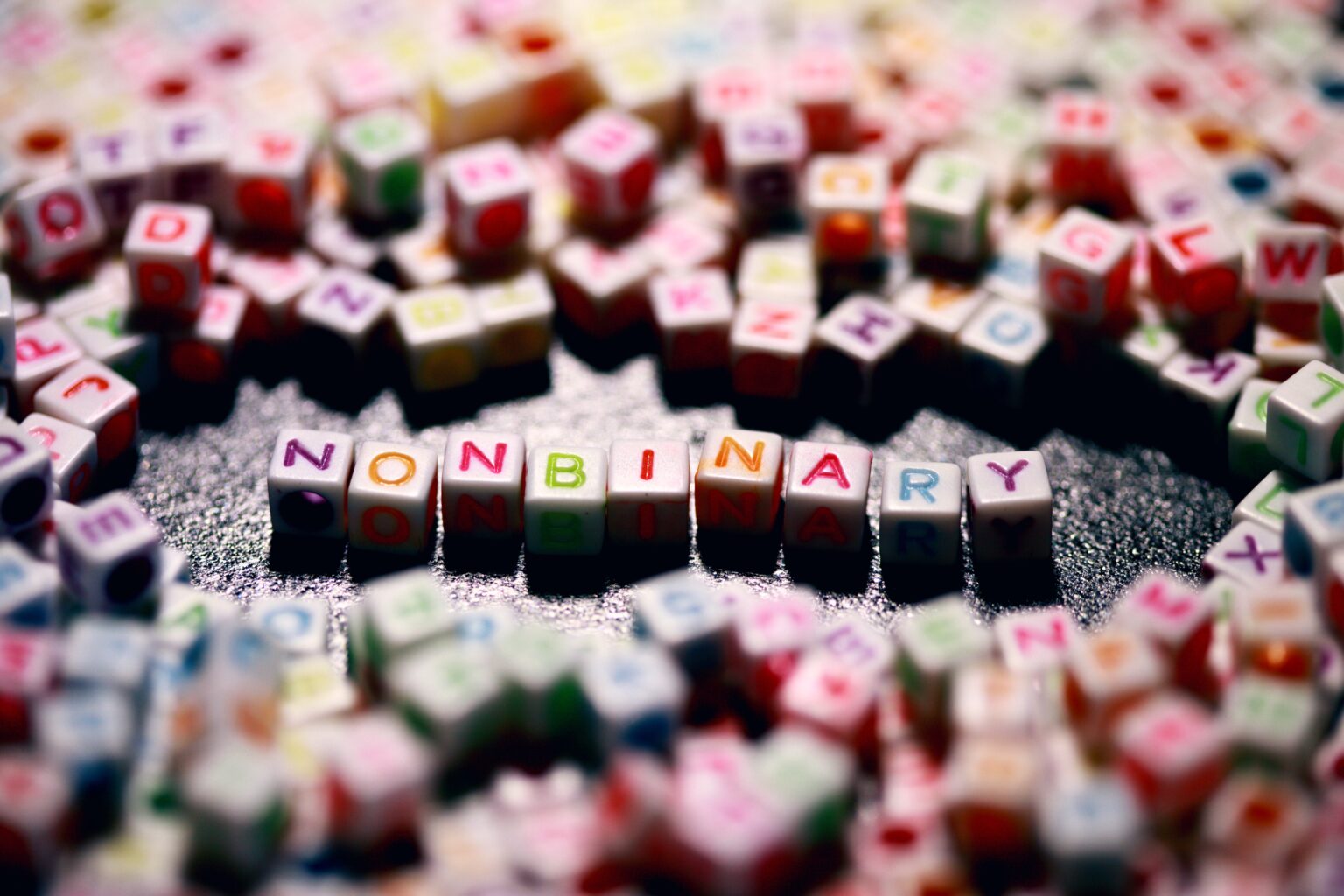
M/F/X/Other: Do you know what non-binary gender markers can be registered today in Europe? To mark International Non-Binary People’s Day, we commend the countries that have introduced the registration of gender markers other than male or female, who using no gender markers at all in their official documentation, and those who are working to adapt their systems to recognise non-binary identities in the near future.
Allowing for non-binary gender markers in official documents is primarily an issue of accuracy, privacy, and respect for a person: non-binary people who must choose between only ‘male’ or ‘female’ gender markers are unable to have their documents match their identities, and as a result are often exposed to privacy violations because of assumptions about their sex assigned at birth.
When your government does not acknowledge or respect who you are, the psychological consequences can be significant. A major survey this year of LGBTI people, conducted by the EU Agency for Fundamental Rights (FRA), indicated that over 50% of trans respondents identified somewhere outside of the binary, while in the EU Trans Study, released in June 2020, one-quarter of the respondents who had not changed their legal gender said that the gender marker they needed were absent. Public opinion is also moving toward supporting non-binary markers: 46% of respondents to the 2019 Eurobarometer supported a third gender marker.
However, right now only three European countries recognise non-binary identities while three others have taken active steps to do so. As this forward trend continues, we hope more and more countries will join the push forward.
Iceland
Since 2019, Icelandic given names are no longer male or female in the national registry, thanks to the Gender Autonomy Act. Moreover, Icelanders registering their gender as “X” can take gender neutral family names meaning “the child of” instead of surnames designating an individual as someone’s son or daughter. However, this option is not available to those registered as male or female.
Germany
The category “divers” was introduced on driving licenses, birth certificates and other official documents in 2019, thanks to the efforts of activists and in particular, Vanja, a German citizen whose demands to be officially registered as “other” were rejected until 2017. However, this third gender category is technically only available only to intersex people who provide a medical certificate at the moment, which means it excludes trans people, non-binary people and intersex people who cannot present a certificate.
Malta
Since 2018, people who do not want to register their gender as male or female in Malta can mark “X” on their IDs. Not many laws in Malta differentiate according to gender. However, as ILGA-Europe found out in this research on non-binary gender registration models in Europe, individuals with an “X” on their IDs may encounter obstacles in the healthcare system, similar to those experienced by intersex people or trans men when, for example, trying to schedule gynaecologist visits. As stated in our research, “this is why it is crucial for anti-discrimination laws to cover gender identity, gender expression and sex characteristics in all spheres of life, including public and private actions.”
The countries taking steps forward:
Belgium
In January 2022, the government introduced a draft bill that will remove gender markers from identity cards. This follows a Constitutional Court ruling from 2019 that partially revoked the gender recognition legislation passed in 2017, stating it was discriminatory for non-binary people, as their gender identity could not be recognised. The ruling stated: “Persons having a non-binary gender identity should have the possibility of adapting the sex shown on their birth certificate to reflect their gender identity.” However, gender markers will only be removed from identity cards and not from the National Registry
The Netherlands
By 2024, Dutch ID cards will be gender-free. The government seeks to end “unnecessary” registration of gender where it is irrelevant. The cities of Amsterdam and Utrecht have already removed gender markers in some documents. In a few cases, the judiciary has ordered a non-binary gender marker to be inscribed. For example, an Amsterdam Court ruled on July 2021 that ‘X’ can be retroactively entered as a gender marker in birth certificates, instead of ‘sex cannot be determined’. However, these cases do not set legal precedents. At the moment, there is no law in place offering the possibility, without obstacles, to have a non-binary gender marker.
Greece
In September 2020, the Magistrate’s Court of Kallithea in Greece recognised non-binary gender identities, stating that the right of the individual to their names is a “statutory element” of their identity.
With our Rainbow Europe module, ILGA-Europe continues, alongside our member organisations to monitor countries across Europe and Central Asia for legislation affecting the lives LGBTI people and their human rights situation. To find out more about Rainbow Europe, click here.
Note: This is an update on our 2020 blog.
M/F/X/Other: 6 countries pushing for non-binary registration in Europe

At the end of September, we welcomed a step forward towards non-binary gender recognition in Greece. Do you know what non-binary genders can be registered in Europe? In this blog, we showcase five countries allowing the registration of gender markers other than male or female, or using no gender markers at all in their official documentation.
In September of this year, the Magistrate’s Court of Kallithea in Greece recognised non-binary gender identities, stating that the right of the individual to their names is a “statutory element” of their identity. Allowing for non-binary gender markers in official documents is primarily an issue of accuracy, privacy, and respect for a person: non-binary people who must choose between only ‘male’ or ‘female’ gender markers are unable to have their documents match their identities, and as a result are often exposed to privacy violations because of assumptions about their sex assigned at birth.
When your government does not acknowledge or respect who you are, the psychological consequences can be significant. A major survey this year of LGBTI people, conducted by the EU Agency for Fundamental Rights (FRA), indicated that over 50% of trans respondents identified somewhere outside of the binary, while in the EU Trans Study, released in June 2020, one-quarter of the respondents who had not changed their legal gender said that the gender marker they needed were absent. Public opinion is also moving toward supporting non-binary markers: 46% of respondents to the 2019 Eurobarometer supported a third gender marker.
These six European countries are on the vanguard in their growing recogntion of non-binary gender, and represent a shift towards equality. One way or the other, they are pointing the way forwards for gender markers.
Belgium
The passing of Belgium’s gender recognition legislation in 2017 was largely celebrated, although it fell short in some respects. Since its enforcement in 2018, a change of gender marker and name is possible in through simple administrative procedure, although minors still have to bring along a medical certificate and a waiting period is required. Despite this positive development, the only choices of gender are, still, male and female. However, in 2019 the Constitutional Court ruled in favour of a non-binary gender option on birth certificates, which could lead to even more positive changes when the ruling is implemented in law. “Persons having a non-binary gender identity should have the possibility of adapting the sex shown on their birth certificate to reflect their gender identity,” the ruling said.
Iceland
Since 2019, Icelandic given names are no longer male or female in the national registry, thanks to the Gender Autonomy Act. Moreover, Icelanders registering their gender as “X” can take gender neutral family names meaning “the child of” instead of surnames designating an individual as someone’s son or daughter. However, this option is not available to those registered as male or female.
Germany
The category “divers” was introduced on driving licenses, birth certificates and other official documents in 2019, thanks to the efforts of activists and in particular, Vanja, a German citizen whose demands to be officially registered as “other” were rejected until 2017. However, this third gender category is technically only available only to intersex people who provide a medical certificate at the moment, which means it excludes trans people, non-binary people and intersex people who cannot present a certificate.
Malta
Since 2018, people who do not want to register their gender as male or female in Malta can mark “X” on their IDs. Not many laws in Malta differentiate according to gender. However, as ILGA-Europe found out in this research on non-binary gender registration models in Europe, individuals with an “X” on their IDs may encounter obstacles in the healthcare system, similar to those experienced by intersex people or trans men when, for example, trying to schedule gynaecologist visits. As stated in our research, “this is why it is crucial for anti-discrimination laws to cover gender identity, gender expression and sex characteristics in all spheres of life, including public and private actions.”
Netherlands
By 2025, Dutch ID cards will be gender-free. The government seeks to end “unnecessary” registration of gender where it is irrelevant. The cities of Amsterdam and Utrecht have already removed gender markers in some documents. However, as reported in ILGA-Europe’s research, “reducing the dissemination and recording of gender information in the Netherlands does not in itself abolish the civil status registration of (binary) genders. For certain purposes, for instance when people come in contact with gender-specific laws (e.g. affirmative action laws or prison allocations), one’s legal gender as registered in the civil registry matters. However, if gender is less important for official identification purposes, it could become also less relevant for the organisation of society in general.”
Y. v France
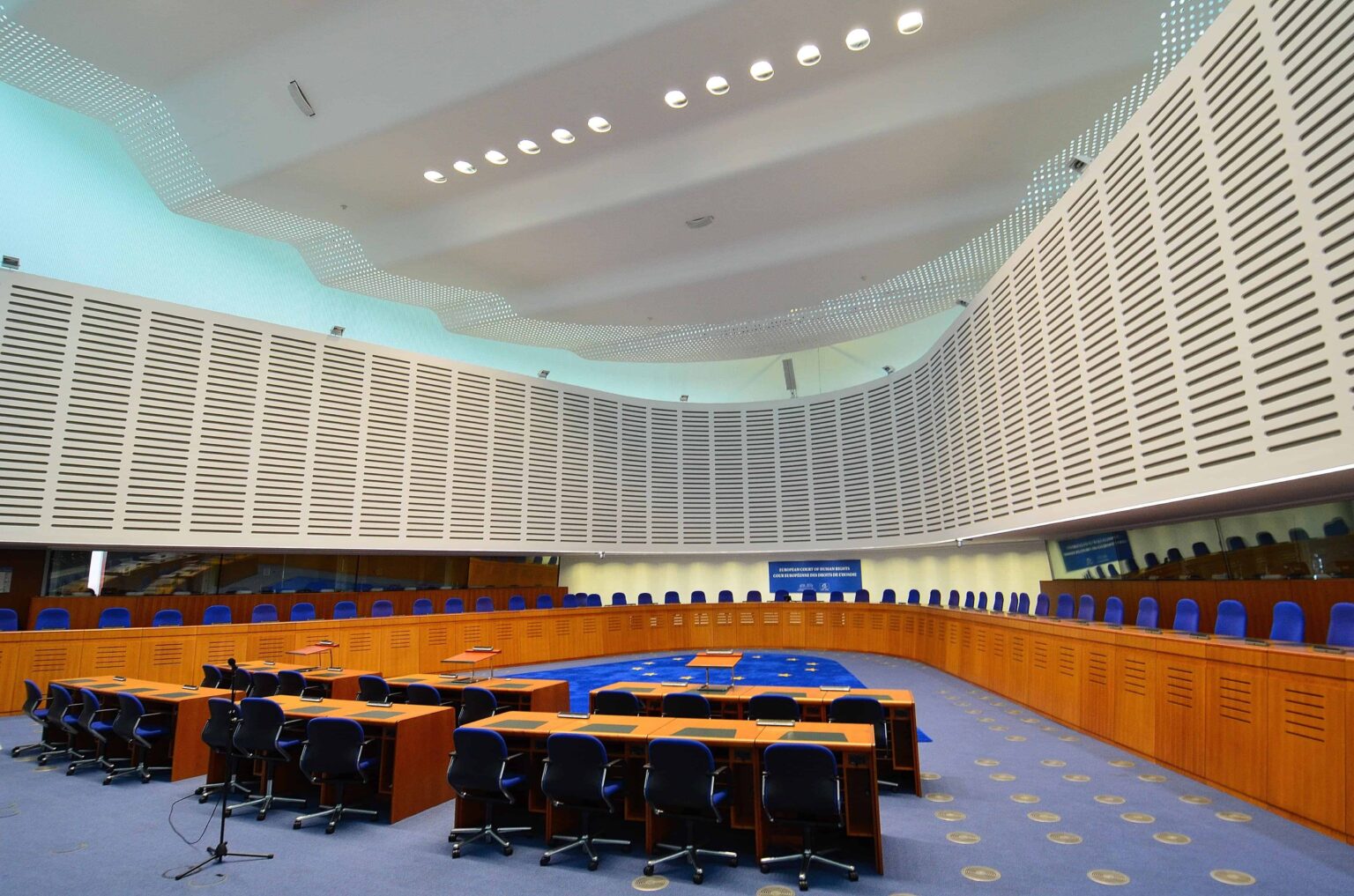
Recognition of non-binary identities.
Submitted jointly by ILGA-Europe, OII Europe, and C.I.A. (Collectif intersexes et allié-e-s).
Briefing note: LGBTI-inclusive Gender Equality work
It is a pivotal moment in Europe, and beyond, when it comes to discussions of gender and gender equality.
With the European Commission’s next Gender Equality Strategy on the near horizon, it is vital to ensure that the Strategy and the resulting policies, programmes, and positions are comprehensive and modern, addressing the gender-based needs of all women and girls in Europe and acknowledging the existence of non-binary and third gender European and global citizens.
On our briefing note, you can find points to remember in these ongoing discussions on inclusive gender equality policies and how to best frame issues impacting LBTI women, as well as non-binary people, where appropriate.
This is a briefing note prepared by ILGA-Europe.
For more information, you can contact Cianán Russell, cianan@ilga-europe.org or Katrin Hugendubel, katrin@ilga-europe.org
Non-binary gender registration models in Europe
The aim of this report is to provide an overview of the different legal gender registration models which somehow cause a break in the static registration of gender as binary, and recognize gender identities as considerably more diverse as is understood under the auspices of the two categories, namely women and men.
It focuses on the legalistic and bureaucratic aspects of implementing these models in order to provide a clear picture how states can avoid unintended consequences when introducing non-binary gender categories, or, conversely, no longer registering gender for various purposes.
The report provides some stance into how non-binary gender registration models affect the human rights, the well-being and social acceptance of non-binary persons. Yet, in order to obtain further conclusive knowledge regarding this topic, more far-reaching qualitative research is necessary.
Since this report serves as a background study for the development of its own policy regarding non-binary gender registration models by ILGA-Europe, it concentrates on possible developments in member states of the Council of Europe (CoE). Nonetheless, it also discusses examples from other regions in order to determine possible best practices and lessons-learned for the European framework.
Bring on 2018 – reaction to German Constitutional Court decision on gender markers
The German Constitutional Court decision is ground-breaking. It’s putting the conversation about recognition of intersex and non-binary people front and centre in a very positive way.
German policymakers now have two options: introduce a third gender option for people who do not identify as a man or a woman, or remove gender registration altogether.
Either way, the official recognition of people outside the gender binary is coming to Germany! Yesterday, the court imposed a deadline that has to be met by legislators, so we know things will change by the end of 2018.
The court ruling recognises the wonderful diversity in our LGBTI movement. There are people who identify as male or female or non-binary. By opening up the options on birth certificates (or even removing the need to note down gender markers on such documents in the first place) it acknowledges the existence of intersex and non-binary people in our societies.
Already in 2013, Germany introduced changes to gender registration. For babies that at birth were identified as intersex, with variations in sex characteristics that don’t fit medical norms for female or male bodies, the gender marker was left blank. However well intended, this blank led to increased stigmatisation of intersex people and raised the pressure on parents to agree to sex-conforming surgeries to make their child fit a male or female gender marker.
ILGA-Europe are very pleased to hear it stated so publicly that more than two gender and sexes exist. We hope that the voices of many, many intersex and non-binary activists will be heard and listened to during the legislative process – as Hanne Gaby Odiele said at our Gala this year, intersex people are part of society and need recognition and respect!
- For more detailed information, read the joint statement from OII Europe, IVIM-OII Germany, TGEU and the German Trans* Association (Bundesvereinigung Trans*).
Hanne Gaby Odiele at European Equality Gala 2017 from ILGA-Europe on Vimeo.
Bring on 2018 – reaction to German Constitutional Court decision on gender markers
The German Constitutional Court decision is ground-breaking.
It’s putting the conversation about recognition of intersex and non-binary people front and centre in a very positive way.
German policymakers now have two options: introduce a third gender option for people who do not identify as a man or a woman, or remove gender registration altogether.
Either way, the official recognition of people outside the gender binary is coming to Germany! Yesterday, the court imposed a deadline that has to be met by legislators, so we know things will change by the end of 2018.
The court ruling recognises the wonderful diversity in our LGBTI movement. There are people who identify as male or female or non-binary. By opening up the options on birth certificates (or even removing the need to note down gender markers on such documents in the first place) it acknowledges the existence of intersex and non-binary people in our societies.
Already in 2013, Germany introduced changes to gender registration. For babies that at birth were identified as intersex, with variations in sex characteristics that don’t fit medical norms for female or male bodies, the gender marker was left blank. However well intended, this blank led to increased stigmatisation of intersex people and raised the pressure on parents to agree to sex-conforming surgeries to make their child fit a male or female gender marker.
ILGA-Europe are very pleased to hear it stated so publicly that more than two gender and sexes exist. We hope that the voices of many, many intersex and non-binary activists will be heard and listened to during the legislative process – as Hanne Gaby Odiele said at our Gala this year, intersex people are part of society and need recognition and respect!
- For more detailed information, read the joint statement from OII Europe, IVIM-OII Germany, TGEU and the German Trans* Association (Bundesvereinigung Trans*).
Hanne Gaby Odiele at European Equality Gala 2017 from ILGA-Europe on Vimeo.